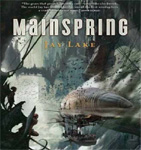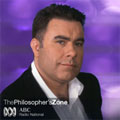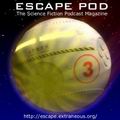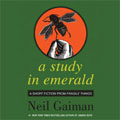
 Mainspring
Mainspring
By Jay Lake; Read by William Dufris
Audible Download – Approx. 13.5 Hours [UNABRIDGED]
Publisher: macmillan audio / audible.com
Published: December 2007
Themes: / Science Fiction / Fantasy / Alternate Universe / Steampunk / Religion / Angels / Science /
The mainspring of the Earth is running down, and disaster to the planet will ensue if it’s not rewound. To do the job the Archangel Gabriel approaches a young clockmaker’s apprentice and explains the problem. He can’t be that surprised, in a clockwork solar system, where the planets move in a vast system of gears around the lamp of the Sun – how could he be? This is a universe where the hand of the Creator is visible to anyone who simply looks up into the sky and sees the track of the heavens, the wheels of the Moon, and the great Equatorial gears of the Earth itself.
Clockmaker’s apprentice Hethor Jacques is graced by a visit from the Archangel Gabriel. Gabriel tells him that he’s been chosen to re-wind the running down mainspring of the earth. If it isn’t re-wound, the world will end – and as such he must find something called “the Key Perilous” (the Mainspring equivalent of our “Holy Grail”). A series of short introductions and good-byes later (with the help of a friendly librarian), Hethor is pressed into the service of a Royal Navy airship (the Bassett) and soon is heading south towards the equatorial wall, atop which the brass gear-works of the Earth and its orbital track meet. Beyond that barrier lies the mysterious ‘Southern Earth.’ Hethor’s quest will take him there and farther south – to the ends of the earth – one way or another.
In a clockwork world who could doubt the existence of God? None, but some still doubt the existence of angels. And that’s just what happens to Hethor. His master and betters think him at best a liar, at worst a thief, and poor young Hethor seems ill-equipped to save the universe. Luckily, a quick trip to the library and he’s on the right track…
Talk about hard to categorize! Jay Lake’s Mainspring offers an utterly unique vision of a world in which the Medieval ideas about how the universe works are literally manifest. Great premise, but it is an undercooked universe that I didn’t wholly buy. The alternate universe changes are interesting, but are not often well grounded. For instance, in the Mainspring world Jesus wasn’t crucified (nailed to a cross), he was ‘horofixed,’ (strapped to a wheel) – kind of makes sense right? Okay, that’s cool – but why, other than for style, did the United States never revolt from the English crown? Why the 19th century airships? Don’t get me wrong, I love airships, but there doesn’t appear to be a logic to their addition. We don’t find out much about the logic for the changes that aren’t obvious either. And that’s basically its problem. Mainspring has many elegant epicycles around its central action, but that action all lacks a core motivation. How can you suspend disbelief if the force of gravity is both an absent actor in the grand scheme (cosmically) but appears to act locally (people aren’t strapped down to the earth)? There are many flourishes, but there are also so many sidesteps to what should be natural consequences. This makes Mainspring have a mechanical, almost “rail-shooter”-novel feel to it. For instance, the novel insists that gravity isn’t what keeps the earth in orbit around the sun (it’s a massive brass clockwork instead), but what keeps the objects on the Earth on the ground? What keeps the airships up (or down)? None of this is answered – or even addressed. I kept hoping that some revelation, something central to the novel, would be revealed, right up to the final pages. Maybe this universe has an intensified magnetic force in it or something? Instead, no, nothing.
Also underdeveloped, and tragically so, is the religious thread. The consequences of seeing the mechanism of what is clearly “creation” in this world are not explored to any significant degree. Indeed, the ramifications from a created world, a world that ‘can run down’, are so lightly touched upon as to be non-existent. The focus is on the adventure of the naive Hethor, his meager beginnings and his sexual awakening. Mostly though, Mainspring is a series of encounters, and visual incredibilities. Like I was saying earlier, it is all undercooked. Jay Lake has vision and talent but this feels far more like his “Count Zero” novel than his “Neuromancer.”
Mainspring is one of the new batch of “exclusive to audible” titles. Veteran narrator William Dufris brings a calm assurance to the many characters who live in a world that seems normal to them, and crazy to us. Sound quality isn’t quite as good as from CD (but this title isn’t available on CD). Once installed, the audible.com download software and the audible checkout system integrate well. It isn’t quite “one click” ordering, but once you’ve made your choice you can have an audiobook on your portable media player and ready to play in less than 30 minutes. I use an iPod Nano, which displays the cover art and bookmarks the files perfectly. I could switch between a regular playlist, a podcast, and multiple audiobooks (from Audible) without losing my place. The experience of listening to and downloading an audiobook from Audible to your iPod is virtually identical to what iPod podcast users get.
Posted by Jesse Willis

 ABC Radio National has some of the best podcast radio shows. It rivals the Canadian Podcasting Corporation’s own terrific podcasts in many respects. One show I get to talk about here every once in a while is The Philosopher’s Zone. The latest show to makes me say: “Hey, check it out.” is…
ABC Radio National has some of the best podcast radio shows. It rivals the Canadian Podcasting Corporation’s own terrific podcasts in many respects. One show I get to talk about here every once in a while is The Philosopher’s Zone. The latest show to makes me say: “Hey, check it out.” is…





 Torchwood: Lost Souls
Torchwood: Lost Souls


